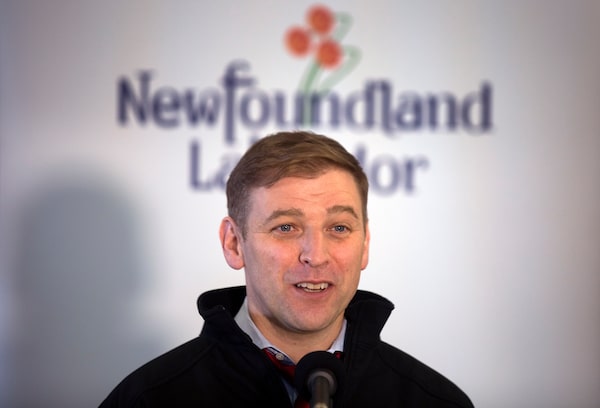
Newfoundland and Labrador Premier Andrew Furey speaks at St. John's Airport, on May 4, 2021.Paul Daly/The Canadian Press
Newfoundland and Labrador Premier Andrew Furey said Friday he’s prepared to make decisions that could cost him re-election in order to get the province out of debt.
Mr. Furey spoke to reporters at the provincial legislature the morning after releasing a prerecorded “state of the province” address that offered sweeping but vague promises about tackling the province’s financial woes.
Pressed for specifics on how his government planned to overcome the province’s $47-billion debt, Mr. Furey said he is prepared to raise taxes and streamline government but he stopped short of providing specifics.
“I think there’s a misinterpretation of my political ambitions, and that this is all based around securing the next election,” he told reporters Friday. “This is a crusade about saving the province, not about the next election.”
Mr. Furey’s speech Thursday was in response to a report last week from an economic recovery team chaired by Moya Greene, which pegged the province’s debt at $47.3-billion when the debts carried by provincial corporations like Nalcor Energy are factored in.
The Greene report makes several hundred pages of suggestions to balance the budget in five to six years, including dismantling Nalcor, renegotiating contracts with public sector unions, cutting funding for the province’s university and its four health authorities, and eliminating the two school boards, including the stand-alone francophone board.
Government is now looking at what might become of the energy corporation, as well as the province’s stakes in offshore oil projects like Hebron, Mr. Furey said. His caucus is also aiming to amalgamate the province’s four health authorities, strike a new funding deal with Memorial University and re-examine the purpose of the school boards.
The Premier said taxes will go up. “We have some of the lowest personal income taxes in Atlantic Canada, and that has to change,” he said. “However, that will not change for low- and middle-income earners in this province.”
The report said the province’s high debt is partly the result of mismanagement by previous governments. Mr. Furey said he’s looking at ways to increase government accountability.
The province is also scrambling to cover about $600-million in financing obligations that come due in November, when the troubled Muskrat Falls hydroelectric project in Labrador finally comes fully online. Ottawa backed the project with billions in loan guarantees, and the Newfoundland and Labrador government is trying to negotiate a refinancing deal.
Mr. Furey said Friday those talks are ongoing but he couldn’t comment further on when an agreement might be reached. “I’m not going to negotiate in public,” he said.
The province’s dire financial position comes up often in the negotiations, and Ottawa is “acutely aware” of what Newfoundland and Labrador is grappling with, Mr. Furey said.
“I would hope that they understand I’m willing to act on some of these urgent issues,” he said. “I hope they were educated both by the Greene report and by the address last night, about the urgency of the situation, the fiscal imbalance that we have. But equally, the hope and optimism for a sustainable future here.”
Our Morning Update and Evening Update newsletters are written by Globe editors, giving you a concise summary of the day’s most important headlines. Sign up today.